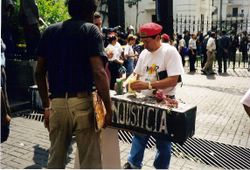 By David Abel | The Boston Globe | 9/2/1999
By David Abel | The Boston Globe | 9/2/1999CARACAS -- Ramon Meza's killers would later say the 30-year-old ex-convict had it coming.
After Meza burst into a shack west of the capital in August, brandished a pistol, and shot a man who was mourning for three friends murdered days before, irate neighbors chased Meza to his house and torched it, killing him, police said.
Meza is one of a growing number of victims of vigilante justice and other serious crimes in Venezuela.
Crime has jumped by more than 30 percent nationwide since a new US-style judicial system was enacted in July, ending a corrupt system known for judges on the take, police arrests on flimsy evidence, and closed trials.
More than 3,000 inmates have been freed since the new system took effect. And another 10,000 could soon follow, many of them accused of murder, rape, armed robbery, and other serious crimes.
"We have had many years of corruption, and this takes a while to change," said Alexis Aponte, vice minister of the Interior Relations Ministry.
Although many blame the new judicial system for the skyrocketing crime, which in the first weekend of August left 118 corpses in this South American nation of 23 million people, the rash stems from problems ranging from rising unemployment to increasing drug trafficking and use.
And the economic malaise has gotten worse since President Hugo Chavez, a failed coup leader who won a sweeping election victory, took power in February. About the same time Chavez was elected, a 12-year low in the price of oil, Venezuela's main export, squeezed the country's poor, estimated at more than 80 percent of the population.
Despite a rebound in oil prices, however, the economy has sunk further into the doldrums. And crime has festered. Analysts blame an underpaid and under-equipped police force, poor education and swelling slums, and the slowness of officials to adapt to the changing judicial system.
"The data on crime have been horrendous," said Richard Hillman, a specialist on Venezuela at St. John Fisher College in Rochester, N.Y, who was robbed twice and once held hostage in Caracas. "Venezuela has been listed as one of the worst offenders of human rights - way before Chavez. The Chavez policies are attempts to deal with an out-of-control situation."
Yet Chavez's critics say he has avoided the problem by casting blame on the nation's 38-year-old constitution and distorting the influence of the new judicial system, approved by the previous administration. "The problem only gets worse when the president says it's OK to rob if you are hungry or have a sick child," said Caracas Mayor Antonio Ledezma, an opposition leader.
Ledezma acknowledged that police resistance to the new judicial system has played its share in the rising homicide toll. In Caracas, reports of lynchings or revenge attacks against suspected criminals who were released soon after being detained have become a weekly occurrence, he said.
Outside the capital, some officials have gone so far as to tell the police not to intervene to protect suspects or criminals released from jail. Orlando Fernandez, governor of the central state of Lara, told his police they shouldn't waste their time shielding "any crook, rapist, assailant, or murderer."
"It's ridiculous to use the police to protect delinquents," he said in August. "I have to look after honest and decent people. . . . I'm too busy to be protecting criminals."
The new judicial system replaces one largely based on Spanish and Napoleonic codes, where the burden of proving innocence falls on the accused.
The past system often provided little if no representation for the nation's vast number of indigents and had filled prisons with thousands of accused but untried suspects. Of some 27,000 prisoners locked away in Venezuela's notoriously inhumane prisons, about 9,700 have been convicted.
The new code was created to sweep away questionable jailings and curtail corruption allegations against nearly half of the nation's 4,700 judges. Now, police must read suspects their rights, allow them to call a lawyer or relative, and provide evidence to prosecutors soon after the arrest.
While for the most part supporting the changes, Chavez has directed a constitutional assembly to amend certain provisions, such as allowing police more latitude in making arrests and digging up evidence.
The president, a former army lieutenant colonel and paratrooper who spent two years in jail after his bloody 1992 uprising, recently sent special units of the National Guard to patrol the violent streets of Caracas.
He has heightened fears that he would not only bolster police with the armed forces but would replace police with soldiers. "We can intervene in any police force in any municipality, because we are not going to permit any tumult or uproar," he told a weekly radio program. "Order has arrived in Venezuela."
David Abel can be reached at dabel@globe.com.
Copyright, The Boston Globe

